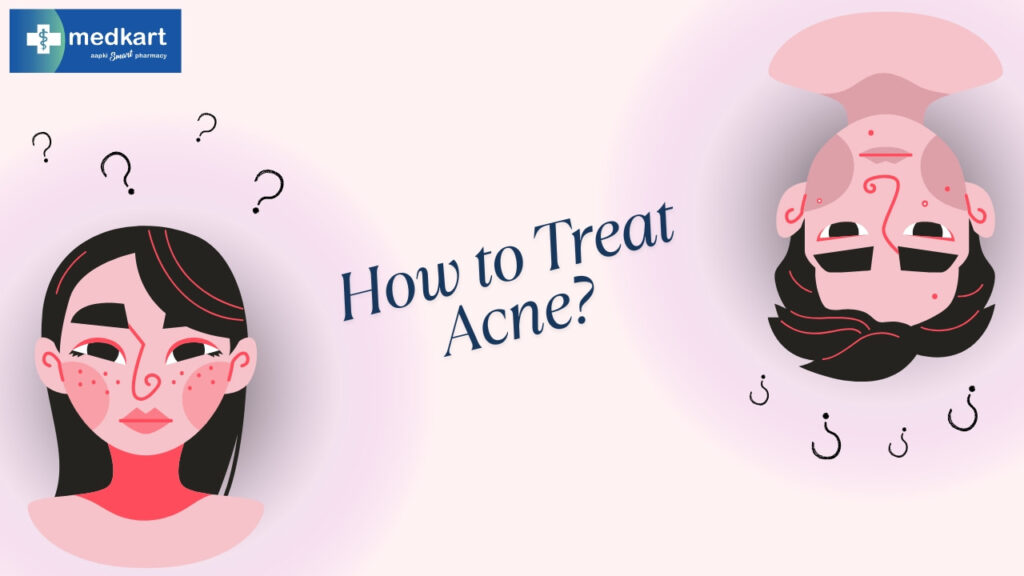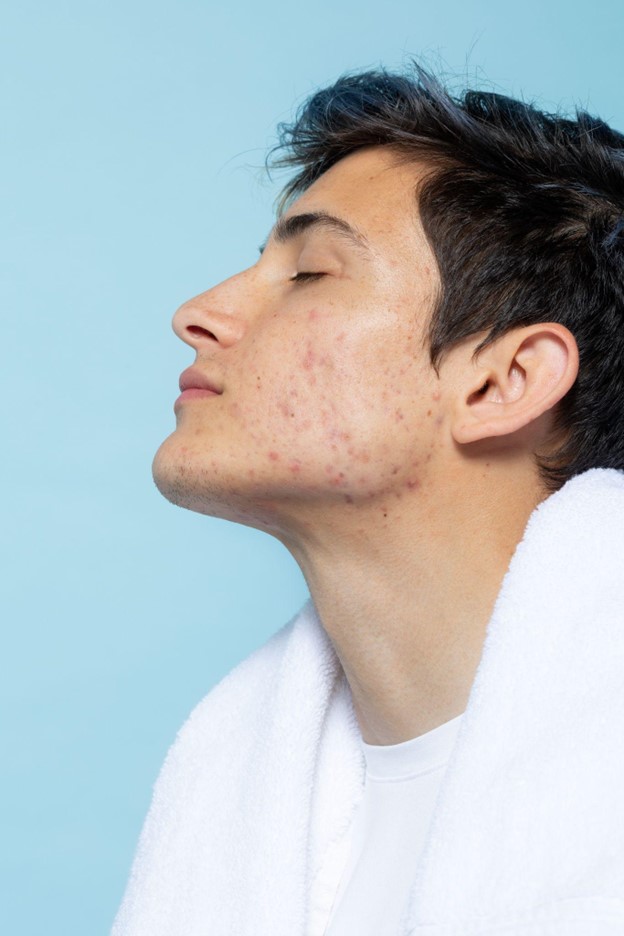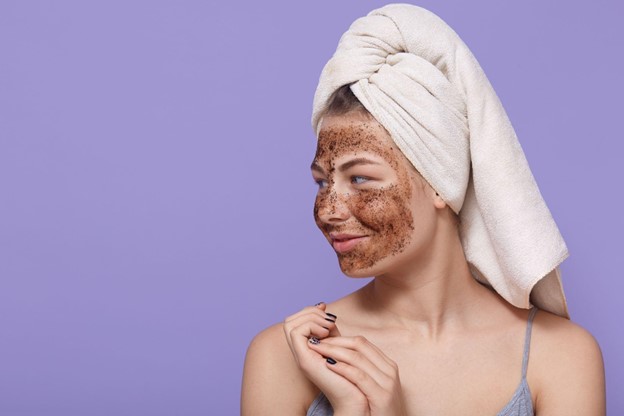Last updated on April 14th, 2025 at 04:55 pm
 Pimple treatment involves a targeted skincare routine comprising gentle cleansing, exfoliation, and the application of topical treatments containing ingredients like benzoyl peroxide or salicylic acid. Adopting a balanced diet, staying hydrated, and managing stress contribute to overall skin health and aid in preventing pimples. In severe cases, dermatologists may recommend prescription medications, chemical peels, or laser therapy for effective and personalized solutions.
Pimple treatment involves a targeted skincare routine comprising gentle cleansing, exfoliation, and the application of topical treatments containing ingredients like benzoyl peroxide or salicylic acid. Adopting a balanced diet, staying hydrated, and managing stress contribute to overall skin health and aid in preventing pimples. In severe cases, dermatologists may recommend prescription medications, chemical peels, or laser therapy for effective and personalized solutions.
Pimples, those pesky little eruptions on our skin, can be a source of frustration and self-consciousness for many. While they are a common part of life, understanding the causes and adopting effective pimple treatment strategies can help manage and prevent them.
Pimple Treatment
Pimples, colloquially referred to as acne, manifest when hair follicles undergo obstruction due to the accumulation of oil and deceased skin cells. The primary factors contributing to pimple formation include excess oil production, bacteria, and inflammation. Hormonal changes, diet, stress, and genetics can also play a role in the development of pimples.

Skincare Routine for Pimple Treatment
Gentle Cleansing: Initiate your skincare regimen by using a mild cleanser designed to effectively eliminate surplus oil, grime, and impurities from your skin. It’s crucial to avoid harsh cleansers, as they can excessively deplete the skin’s essential oils, leading to an escalation in oil production. Opt for a gentle, fragrance-free cleanser tailored to your specific skin type for optimal results.
Exfoliation: Frequent exfoliation aids in the elimination of lifeless skin cells, thwarting their potential to congest pores. Use a mild exfoliant containing salicylic acid or glycolic acid a few times a week to keep the skin’s surface smooth.

Topical Treatments: Incorporate topical treatments containing benzoyl peroxide or salicylic acid to target acne-causing bacteria and reduce inflammation. These instructions are designed to be directly implemented in the areas that are impacted.
Moisturization: Contrary to common belief, moisturizing is essential for all skin types, even oily or acne-prone skin. Choose a non-comedogenic, oil-free moisturizer to maintain skin hydration without clogging pores.
Sun Protection: Always use a broad-spectrum sunscreen with an SPF of 30 or higher, especially when using acne treatments. Sunscreen prevents hyperpigmentation and protects the skin from UV damage.
Lifestyle Changes for Pimple Prevention
Balanced Diet: Maintain a well-balanced diet rich in fruits, vegetables, whole grains, and lean proteins. Avoid excessive consumption of dairy, sugary foods, and high-glycemic-index items, as they may contribute to acne development.
Hydration: Drink plenty of water to keep the skin hydrated and help flush out toxins. Proper hydration supports overall skin health and can aid in preventing pimples.
Stress Management: Chronic stress can trigger hormonal imbalances leading to acne. Practice stress-reduction techniques such as meditation, yoga, or deep breathing exercises to promote both mental and skin well-being.
Regular Exercise: Physical activity improves blood circulation and promotes healthy skin. Aim for approximately 30 minutes of moderate exercise most days of the week.
Pimple Professional Treatments
For persistent or severe acne, consider seeking advice from a dermatologist who can recommend more advanced treatments, such as:
Prescription Medications: Dermatologists may prescribe topical or oral medications like retinoids, antibiotics, or birth control pills to address the underlying causes of acne.
Chemical Peels: Chemical peels can help improve skin texture and reduce acne by removing the outer layer of skin.
Laser Therapy: Laser treatments target bacteria and reduce inflammation, offering an effective solution for severe acne cases.
Also, Read:
- How to Remove Dark Circles?
- How to Remove Tan from Face?
- How to Prevent Hair Fall?
- How to Remove Black Spots on Face?
- How to Reduce Face Fat?
Scalp Pimples Treatment
Scalp blemishes, commonly recognized as scalp acne or folliculitis, can be an unpleasant and irritating condition. Treating these pesky bumps on the scalp requires a specialized approach to ensure relief and prevent recurrence.
Scalp pimples, much like facial acne, occur when hair follicles become clogged with oil, dead skin cells, or bacteria. They can be triggered by factors such as excess oil production, poor hygiene, sweat, or even the use of certain hair products.

Scalp Pimple Treatment Strategies
Gentle Cleansing: Start by washing your hair regularly with a mild, sulfate-free shampoo. This helps remove excess oil, dirt, and product build-up without stripping the scalp of its natural oils. Avoid harsh, drying shampoos, as they may worsen the condition.
Antibacterial Shampoos: Choose a medicated shampoo containing ingredients like salicylic acid, tea tree oil, or ketoconazole. These help combat bacteria, fungi, and inflammation, providing relief from scalp pimples. Use the shampoo as directed on the packaging.
Avoiding Irritating Hair Products: Opt for hair care products labelled as non-comedogenic, meaning they won’t clog pores. Avoid heavy conditioners and styling products that may contribute to pore blockage. It’s also advisable to keep hairstyles loose to allow the scalp to breathe.
Topical Treatments: In more stubborn cases, consider applying over-the-counter spot treatments or medicated ointments directly to the affected areas. Look for products containing benzoyl peroxide or salicylic acid.
Healthy Scalp Habits: Sustain your well-being by ensuring adequate hydration, embracing a diverse and nutritious diet, and effectively navigating stressors to maintain a wholesome lifestyle. These factors contribute to overall skin health, including the scalp.
When to Seek Professional Help
If scalp pimples persist or become severe, consult a dermatologist. They can provide a more accurate diagnosis and recommend prescription-strength shampoos, topical treatments, or antibiotics if the condition is bacterial in nature.
> Consult a Doctor and Medkart will help you Order Medicines Online
Conclusion:
Achieving clear skin involves a holistic approach that combines a consistent skincare routine, healthy lifestyle choices, and professional guidance when necessary. By understanding the causes of pimples and adopting a tailored treatment plan, you can take control of your skin health and embrace a radiant complexion.
Scalp pimples can be effectively managed with a combination of proper hygiene, targeted treatments, and lifestyle adjustments. By incorporating these strategies into your routine, you can promote a healthy scalp and enjoy relief from the discomfort of scalp pimples. If issues persist, seeking professional guidance ensures a more tailored and effective approach to treatment.
Read: What are Generic Medicines?
FAQs on Pimple Treatment
Q1. What is pimple treatment?
Pimple treatment involves a targeted skincare routine, including gentle cleansing, topical treatments, and lifestyle adjustments to address factors such as diet and stress, aiming to reduce inflammation and prevent future breakouts. In severe cases, dermatologists may recommend prescription medications or advanced procedures like chemical peels or laser therapy for effective management.
Q2. Can I use toothpaste to treat pimples?
While toothpaste may contain ingredients that can temporarily dry out a pimple, it’s not recommended as a long-term solution. Specialized acne treatments with ingredients like benzoyl peroxide or salicylic acid are more effective and less likely to irritate the skin.
Q3. How long does it take for pimple treatments to show results?
Results vary, but consistent use of skincare products may show improvement in a few weeks. For prescription medications or professional treatments, it may take several weeks to months to see significant changes, depending on the severity of the acne.
Related Links:
-
- Normal Heart Rate by Age
- Maximum Delay in Periods if not Pregnant
- Random Blood Sugar Normal Range
- Maximum How Many Days to confirm Pregnancy?
- How to Increase Sperm Count?
- BP Normal Range for Female
- DM Full Form in Medical
- How To Grow Hair Faster?
- Why Prescription by Brand Name is Dangerous?
- Home Remedies for Loose Motion
- Diet Plan For Weight Loss
- How to Increase Breast Size?
